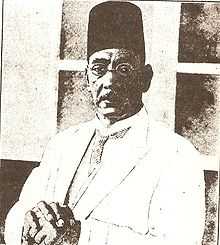Hafez Ibrahim

Hafez Ibrahim (Arabic: حافظ إبراهيم, Ḥafeẓ Ibrāheem) (1872–1932) was an Egyptian poet, called (Arabic: شاعر النيل, Shāiʻer Al-Neel), means the Poet of the Nile. He was one of several poets that revived Arabic poetry during the latter half of the 19th century. While still using the classical Arabic system of meter and rhyme, these poets wrote to express new ideas and feelings unknown to the classical poets. Hafez is noted for writing poems on political and social commentary.
He was born on a ship floating in the Nile near Dairout, which is a city in Asyut District. His father was Egyptian, and his mother was Turkish. Both died when he was young. Before his mother died, she brought him to Cairo. There, he lived with his poor uncle, a government engineer. His Uncle later moved to Tanta, where Hafez went to school. Hafez was touched by his uncle's poverty; after a time, he left his uncle. ِ After this, Hafez spent some time living on the Tanta streets. He eventually ended up in the office of Muhammed Abu Shadi, who was one of the 1919 revolution leaders.
Hafez Ibrahim is quoted of saying: “When you educate a woman, you create a nation.”
Works
Many poems were written by Hafez, for example:
- Albasoka Al-deema' Fawq Al-deema', ألبسوك الدماء فوق الدماء (They have dressed you the blood over blood).[1]
- Ya Saidy wa Emami, يا سيدي و إمامي (O, My Mister and my Imam).[1]
- Shakrto Jameela Sonekom, شكرت جميل صنعكم (I've thanked your favor).[1]
- Masr Tataklam 'an Nafseha, مصر تتكلم عن نفسها (Egypt talks about herself).[1]
- Le Kes'a An'em behe mn Kes'a, لي كساء أنعم به من كساء (I've a dress, and what an excellent dress).[1]
- Qol lel ra'ies Adama Allah Dawlatahu,قل للرئيس أدام الله دولته (Tell the President, May Allah eternized his state).[1]
- Translation of Les Misérables by Victor Hugo, 1903[2]
References
| Arabic Wikisource has original text related to this article: |
- Hourani, Albert. A History of the Arab Peoples. New York: Warner Books, 1991. ISBN 0-446-39392-4.
|